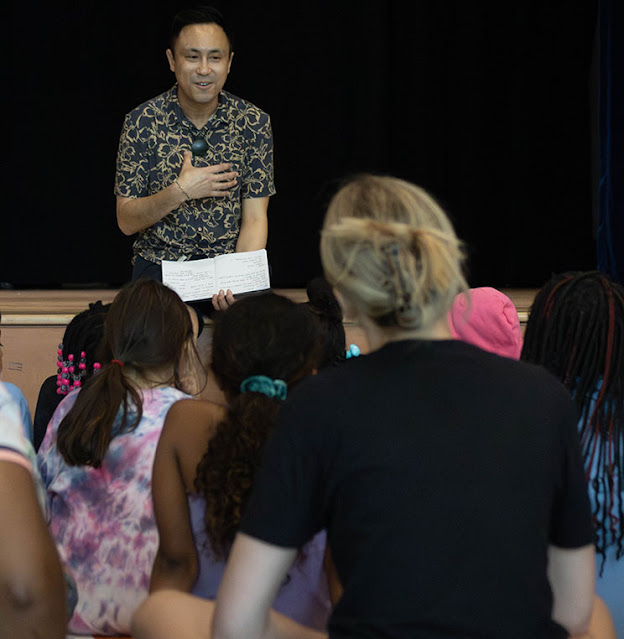It was a scorching day in Washington DC in late July, but rather than seeking shelter from the heat and humidity in one of the city’s many air-conditioned museums, I found myself in a school gymnasium thrumming with the laughter of 40 kids and adults chasing a soccer ball across the polished floor. The kids were ‘poet-athletes’ taking part in a summer camp programme with DC SCORES, a not-for-profit organisation that uses soccer and poetry to ‘give kids the confidence and skills to succeed on the playing field, in the classroom, and in life’. My indoor soccer days were far behind me, so I was there in my capacity as Aotearoa’s Poet Laureate.
I was in Washington DC as a member of Slow Currents, a cohort of Asian diaspora writers from Aotearoa and Australia. In 2022, we participated in online workshops with Asian American writers, including Pulitzer Prize winners Viet Thanh Nguyen and Hua Hsu, and acclaimed Palestinian American poet George Abraham. The main purpose of our trip to DC was a two-week residency to work on our individual projects and to meet with key people in the Asian American writing community to share knowledge and ideas about how we can empower and create opportunities for our own communities. We also lined up some last-minute events while we were in town, including performances at the famous Busboys & Poets, and the first-ever open mic at the Kennedy Centre. (The Asian American Literature Festival, which we were due to participate in, was abruptly cancelled in the week leading up to us arriving in the States. To date, the Smithsonian Asian Pacific American Center has failed to give organisers and participants a transparent reason for the cancellation. There’s murmurs that the programme’s trans and non-binary content spooked the Sminthsonian’s conservative stakeholders.)
 |
| The culture galleries at the National Museum of African American History & Culture, Washington D.C. Photo by Chris Tse. |
Before leaving a typical Wellington winter for summer in Washington DC, I reached out to the New Zealand Embassy to see whether there might be opportunities for me to partner with them for an event while I was in DC. The timing couldn’t have been better—the Embassy had been working with DC SCORES to plan a day to celebrate the FIFA Women’s World Cup being hosted in Aoteaora and Australia.
Despite my initial scepticism about soccer and poetry being natural bedfellows, I was instantly won over by the kids’ enthusiasm for both. After sharing some of my poems, I fielded some creative and incisive questions from the kids. What I love about moments like this is that it strengthens my own relationship to poetry, and reminds me how powerful it can be to connect with others through the power of storytelling and poetry. As much as the laureateship has been about raising my own profile as a poet and promoting poetry in general, it’s also taught me a lot about myself and how the role of Poet Laureate can act as an intermediary — something like a poetry matchmaker, if you will.
Today is National Poetry Day, which means I’m now halfway through my two-year term. Over the past year, I’ve met and spoken with thousands of people of all ages and backgrounds, from running writing workshops in schools to meeting with a public sector organisation’s pan-Asian staff network. Each of these engagements has been a chance to share my love of poetry and gauge people’s feelings about what is often considered an impenetrable and inaccessible art form.
I know some have had bad experiences with poetry because of how it was taught at school, but my appeal to them is to let that go — start afresh and embrace poetry that speaks to them and their interests. As an artform, poetry is as varied as music or film—there truly is something out there for everyone, from Chaucer to spoken word. I’m heartened when teenagers tell me they’re reading contemporary New Zealand poets (by choice!) or when a retired grandmother makes their debut at an open mic. All of this reinforces to me that poetry can be for everyone — it’s about finding a way into it that resonates with them.
I’d be lying if I said the past year hasn’t been hectic — my entire life has shifted to put poetry front and centre. It’s been chaotic in the best way and surprising too (for starters, I never imagined I’d see my face plastered on the backs of buses). Invitations to speak and perform have come from as far as Invercargill and Leeds in the U.K., which is where I’ll be next month for a festival. As I told the kids at DC SCORES, I knew I’d never represent Aotearoa in sport, but I’m immensely proud to represent our country and its phenomenal poets on a global stage.
 |
Chris Tse reads to poet-athletes at DC SCORE's summer school programme in Washington D.C., July 2023. |
If there’s one thing I want to achieve before my term is over, it’s to shift perceptions about poetry being ‘difficult’ to help people find new ways into enjoying it. We’re surrounded by poetry, from the way shadows scatter themselves on the pavement to someone being moved to speak out about injustice.
I’ve no doubt that I have another busy year filled with poetry ahead of me, and I can’t wait to share it with Aotearoa and the world.
Chris would like to thank the New Zealand Embassy in Washington DC for arranging his visit to DC SCORES, and Creative New Zealand for its support of the Slow Currents residency.